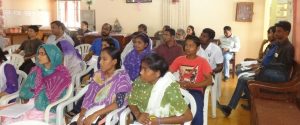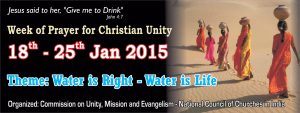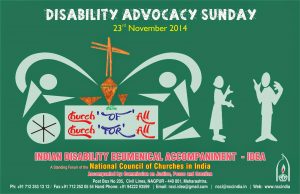Diaconal Church in a Radically Changing India.
Chennai Affirmation
We, the participants of the National Consultation on ‘Diakonal Church in the Radically Changing India’, held at Chennai on the 23rd and 24th February 2015 jointly organized by the Church of South India Synod and Christian Institute for the Study of Religion and Society hereby declare that…
The ‘Diakonal Church’ is the one that is sensitive to the concerns of poor, oppressed and socially, traditionally and historically excluded communities. It is to prepare a Table for ‘all’ to join the ‘koinonia‘ of the resurrected Christ’s community without any discrimination by affirming everyone’s dignity, respect, identities and differences.
The motto of ‘Diaconal Church’ is to serve but not to be served (Mark 10: 45). It facilitates the Christian faith communities to embark on a journey to serve the earth communities leaving the comfort zone to take up a ‘kenotic’ and servant leadership. It is to bear a public witness politically in the presence of resurrected Christ and to re-embark on a journey of accompaniment with the struggling communities for fullness of life and livelihood.
This ‘diakonia‘ demands not only the ‘service’ but also preparation of the space to create communities of equals and dignity as described in Nazareth manifesto (Luke 4: 61-21). It is to explain the vision of God and symbolize the ‘reign of god’ with the values of Love, Justice and Peace by prophetically healing, restoring and reconciling the societies of conflicts and disparities towards fullness of all lives.
Context
We realize that, the ‘mantra’ of Economic Globalization and Developmental paradigm of the States change the whole world to be ‘flat’ through communicating and consolidating the capital accumulations of wealth through trans-national corporatism, extractive industrialization and ecological exploitation and victimization of the earth communities by uprooting of habitats from their traditionally living and culturally rooted environments.
These ‘flattening’ policies and principals of the ‘Economic Globalization’ are creating the tailor-made ‘flat’ societies and communities by inculcating the values such as ‘consumerism’, ‘privatization’ , ‘individualism’, ‘competition’ and ‘inequality’.
We observe that, in the context of radically changing Indian contexts, the ‘majoritarianism’, rise of ‘right-wing ideological fundamentalism’ and hate campaigns are creating panic and insecurity among the ‘minority communities’, ‘economically poor’ and ‘religiously and culturally excluded’, such as Dalits, Adivasis, Tribals, Women and Children. They turn the communities to be against one another with hate and hostility.
In this context of crisis, the churches as called and committed faith communities are to be prophetic and mandated to work ‘on’ equality and ‘for’ equality. The 2010 Edinburgh declaration calls the churches of our times to re-look and review our vision, theologies and ministries from the growing influence of ‘prosperity theologies’, ‘individualistic eschatology’, upholding caste and patriarchy, and becoming the mammon worshipers.
We affirm that…
- The Diakonal Church as a prophetic community, is called to ensure respect, dignity and life of the earth communities including the human communities through the appropriate interventions and encounters with the oppressive attitudes of the ‘Powerful, Dominant Empires and States’ by engaging in ‘diakonia’.
- The Diakonal Church is a conscious servant ‘of’ and ‘to’ all by prophetically engaging and encountering conformity with the Powers
- The Diakonal Church is called to promote and prorogate the liberative and transformative Gospel values of Love, Justice and Peace in combating the exclusivism, fundamentalism and economy based prosperity gospel and theology
We Confess that…
- the ‘diakonia’ today is mainly dependent on funded projects and serving from comfortable zones
- the Indian Church today is panicked and suffocated by the ‘minority phobia’ with exclusive demands of ‘minority Rights rather than working towards promoting, defending and affirming the fundamental rights of every individual
- the churches today are mostly crawling with the exclusive and prosperity theologies rather than having faiths on ‘theology of fullness of life and Economy of Life’.
the diakonal expressions were initially founded to serve the poor and the excluded communities but now it meets the expectations of the elites and rich involving in commercialization and comodifaction of knowledge through our Institutions
- the Churches today are strategically made silent by the law enforcement of States while it is supposed to be prophetically accompany the journeys with the victims.
We are committed to…
- charting a discourse on vision, mission and diakonal expressions of the churches today in terms of Kerigma, Metanoia and Koinonia as embedded in the Scripture.
envisioning a world with fuller humanity and fullness of life by enabling truth and reconciliation with the entire earth communities towards Just-peace
ensure the ‘transparency, accountability and responsibility in all our structures and institutions and launch a campaign for ‘transparent India’
- listening stories of the ‘diakonia’ of neighbors of other faiths to encompass the diakonia ‘of’ all and diakonia ‘for’ all
We call upon all the churches and ecumenical movements:
- to draw a creative and relevant, radical and prophetic ‘diakonia’ for today
- to strategically plan and execute ‘prophetic ‘diakonia’ by facilitating the local congregations for public witness
to be united in combating the hate campaigns such as ‘Ghar Wapsi’ constitutionally and politically.
Proposed Activities
- Net-working with the churches, Christian Institutions and Ecumenical Movements to promote a relevant ‘diakonal Church’
Initiate the process of organizing conversation with the church leaders and ecumenical bodies at the regional level enhancing the capacities of the laity and clergy engage in the ‘prophetic-dia’konia’ towards transformative mission in the Socio Economic and Political Context of India
- Initiating process to develop, articulate and promote a new context specific and relevant ‘diakonia’ for all
- Facilitating the theological fraternities and local congregations to move from the prosperity theology to ‘economy of life’ and to move from charity to solidarity and accompaniment
- Promoting the holistic vision of theology of life as a pilgrimage of justice and peace

 A seminar entitled “Smart Church: Youth initiatives for an efficient, vibrant, communicating Church” was held on February 17, 2015 at Azariah House at National Council of Churches in India (NCCI) campus in Nagpur. It was jointly organized by NCCI’s Commission on Communications & Relations and the Commission on Youth. The purpose of this seminar was to provide space for young people from our Churches to come together bringing their own experiences and ideas towards enhancing the ministries of the Church, especially in their organizational aspects, and particularly in terms of consolidating the communication systems, tools and processes. The program was attended by 28 participants from several protestant denominations as well as Roman Catholic orders.
A seminar entitled “Smart Church: Youth initiatives for an efficient, vibrant, communicating Church” was held on February 17, 2015 at Azariah House at National Council of Churches in India (NCCI) campus in Nagpur. It was jointly organized by NCCI’s Commission on Communications & Relations and the Commission on Youth. The purpose of this seminar was to provide space for young people from our Churches to come together bringing their own experiences and ideas towards enhancing the ministries of the Church, especially in their organizational aspects, and particularly in terms of consolidating the communication systems, tools and processes. The program was attended by 28 participants from several protestant denominations as well as Roman Catholic orders. Christian communities are now more frequently targeted for violence. In Delhi, in less than two months five Church buildings have been vandalized or burnt down. The police have not solved most of the cases and it has created a sense of fear among the Christian Community in India.
Christian communities are now more frequently targeted for violence. In Delhi, in less than two months five Church buildings have been vandalized or burnt down. The police have not solved most of the cases and it has created a sense of fear among the Christian Community in India. Nagpur (India) 14 Jan 2015 The Week of Prayer for Christian Unity is an international
Nagpur (India) 14 Jan 2015 The Week of Prayer for Christian Unity is an international  Church leaders representing the National Council of Churches in India (NCCI) and the Regional Christian Council of North West India met the President of India, Shri Pranab Mukherjee at Rashtrapati Bhawan on 24th December, 2014. The Church leaders greeted him on the occasion of Christmas and offered prayers for his health and for the Nation.
Church leaders representing the National Council of Churches in India (NCCI) and the Regional Christian Council of North West India met the President of India, Shri Pranab Mukherjee at Rashtrapati Bhawan on 24th December, 2014. The Church leaders greeted him on the occasion of Christmas and offered prayers for his health and for the Nation. We are in a crucial point of time in the Indian history, while we celebrate the Dalit Liberation Sunday in 2014. The grip of fascism and communalism becomes firm on Indian society. These regressive and dangerous elements are only the tip of the iceberg and the undercurrent of all these elements in India is casteism.
We are in a crucial point of time in the Indian history, while we celebrate the Dalit Liberation Sunday in 2014. The grip of fascism and communalism becomes firm on Indian society. These regressive and dangerous elements are only the tip of the iceberg and the undercurrent of all these elements in India is casteism. Disability Day, or the International Day of People with Disability, is a day that is sanctioned by the United Nations. The aim of Disability Day is to encourage a better understanding of people affected by a disability, together with helping to make people more aware of the rights, dignity and welfare of disabled people. Disability Day was founded in 1992 and is a day that is marked around the world by a variety of events held in many countries. The original name for this day was the International Day of Disabled Persons. The day’s origins date back to 1981 and the International Year of Disabled Persons, which was created to improve the lives of disabled people all around the globe, as well as to prevent disabilities from occurring in the first place. The Day is used for holding discussions, forums and campaigns relating to disability, and communities are encouraged to organise performances in their local area. These can range from hosting a musical to a play, and disabled people should be involved in these productions. The overall aim is to show that a person with a disability can be a vibrant member of society. Each year the day is celebrated there is an emphasis on a new aspect related to improving the lives of people living with a disability. In 2012 there was a call to help disabled people live in an inclusive society in every country, and to make sure that society was as accessible as possible for disabled people.
Disability Day, or the International Day of People with Disability, is a day that is sanctioned by the United Nations. The aim of Disability Day is to encourage a better understanding of people affected by a disability, together with helping to make people more aware of the rights, dignity and welfare of disabled people. Disability Day was founded in 1992 and is a day that is marked around the world by a variety of events held in many countries. The original name for this day was the International Day of Disabled Persons. The day’s origins date back to 1981 and the International Year of Disabled Persons, which was created to improve the lives of disabled people all around the globe, as well as to prevent disabilities from occurring in the first place. The Day is used for holding discussions, forums and campaigns relating to disability, and communities are encouraged to organise performances in their local area. These can range from hosting a musical to a play, and disabled people should be involved in these productions. The overall aim is to show that a person with a disability can be a vibrant member of society. Each year the day is celebrated there is an emphasis on a new aspect related to improving the lives of people living with a disability. In 2012 there was a call to help disabled people live in an inclusive society in every country, and to make sure that society was as accessible as possible for disabled people.